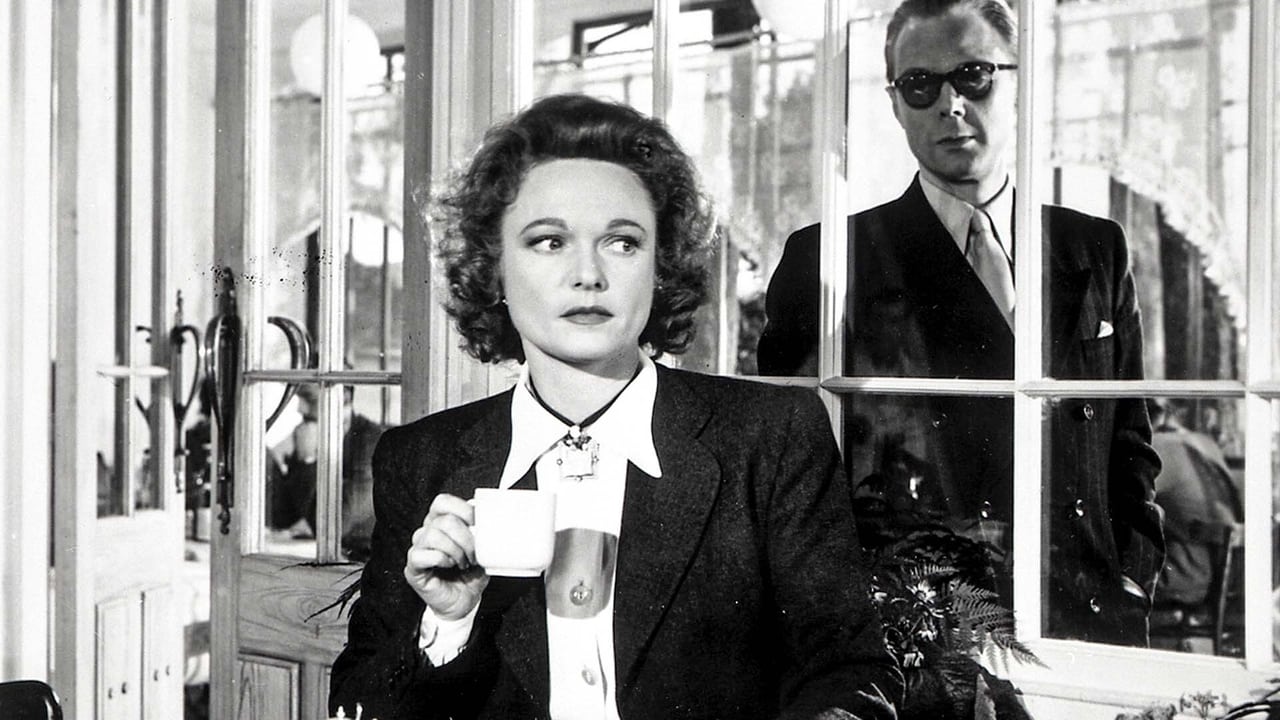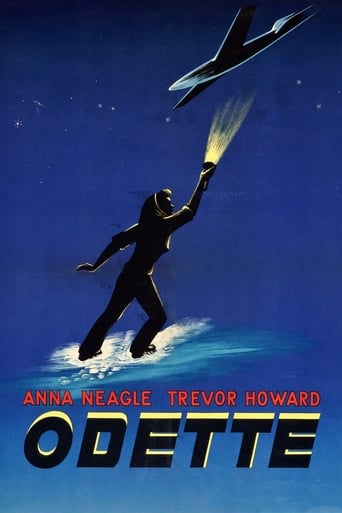Matialth
Good concept, poorly executed.
Contentar
Best movie of this year hands down!
WillSushyMedia
This movie was so-so. It had it's moments, but wasn't the greatest.
Nayan Gough
A great movie, one of the best of this year. There was a bit of confusion at one point in the plot, but nothing serious.
MartinHafer
"Odette" is the true story of Odette Sansom, an incredibly brave lady who risked her life as a spy during WWII. Much of the film is about her exploits in France during the Nazi occupation and the final portion is about her being caught, tortured and imprisoned. While the film is a bit slow here and there, I appreciates so much about it. First, while it was sanitized and you didn't see the same degree of horrors Odette saw in Ravensbruck concentration camp, the film didn't succumb to 'Hollywoodizing'....fictionalizing her story in order to make a supposedly better film. You see her as she was...a brave but vulnerable woman. Second, the story was a bit underplayed...and seemed more real because of it. Overall, an exceptionally well made and true story of an incredible lady.
rdolan9007
The film Odette, I think, is less well known than 'Carve her name with pride' - a film that deals with fairly similar wartime themes and is also based on a true story. I do think that Odette probably suffers, but only slightly in comparison, as it is a little too stolid in places. Both films would make excellent companion pieces, however, and 'Odette' is certainly well worth watching.Odette is about a French women (Odette) who is sent to France as part of SOE. She has initially been sent to work with the French resistance around the important wartime port of Marseille. Whilst there she gradually falls in love with a British resistance man (Trevor Howard) who is also working undercover in France. Their relationship builds slowly through the film, surviving both prison and torture by the Gestapo, until after their terrible experiences they are reunited in Britain.The love story is mostly understated, but underscores the nature and real danger of 'resistance' work in France. The film is sometimes a little stiff upper lipped and can be a little jarring, but the important scenes are done very well.Those scenes include the torture of 'Odette' although the violence to her is not shown. The menace is there though in the framing of the scene, and you see a gestapo man take a red hot poker out of a stove, with the clear implication that he will burn her back with it. She also has her toe-nails pulled out, although we do not see that portrayed in the film. While the suggestion of Gestapo violence is palpable, it is the scene after her torture that sticks in the mind. You can see the pain seemingly etched in her face, her hair bedraggled, and clinging with sweat to her forehead.It is a very powerful scene, which works extremely well in expressing the torment she went through. Strangely and unfortunately enough the film probably doesn't exude enough menace early on. The acting is good as you might expect from Trevor Howard. Anna Neagle who plays Odette is good as well. There is a nice cameo from Peter Ustinov as a French and occasionally grumpy wireless operator.There is some attempt not to simply have all the Germans as one dimensional. The main German antagonist (Marius Goring) does portray a more complex German. He does not like the Gestapo and their methods, even if, as is pointed out, he goes along with what they do.The other notable scene includes the concentration camp 'Ravensbruck' were the story becomes even darker. Odette is tortured by being imprisoned in solitary confinement with little or no food, and with the heating deliberately turned up to as hot as possible. She nearly dies from this, although she is given slightly better treatment after that. The sadism of the German women guards is hinted at in the film, although not in its probably horrifying detail. Odette is eventually rescued by the camp commander, who tries to save his own skin by releasing her to the advancing Americans.There is some humour despite the dark material in the film, but it is mostly rather forced and stilted. I think the film is probably overlong, and the script lacks bite early on. The film is of its time, and the film probably softens some scenes that a modern audience would probably expect to see.It does a mostly successful job, however, of explaining 'Odettes' story; she did receive a well deserved 'George Cross' for her bravery. I think this is an important film, not simply for its look at her work in the French resistance, but for her confinement in Ravensbruck, were many brave women would not survive the war in that camp. They were often executed there, or basically left to die.If you are interested there is a Wikipedia page dedicated to the prominent women who died in Ravensbruck, and it also contains more sobering detail on the nature of the suffering they endured.I don't this film ranks as one the great war films, the script is a little leaden at times, and until later on in the film there is not that feeling or menace your might expect. I would recommend it none the less, the story is compelling enough to overcome the difficulties with the script.
morphyesque
Being a connoisseur of 1940/early 50s films with an extensive collection, I was surprised that I had never seen "Odette" before but have now done so courtesy of Youtube.The plot is similar to "Carve her name with pride"(1956) starring Virginia McKenna), that is a French woman living in the UK who volunteers to help the allies and Resistance in France during WW11.Anna Neagle showed her lack of linguistic ability speaking French & lapsing into English several times even when speaking to French Resistance workers.On the other hand the German speaking actors were quite authentic in their roles with the producers NOT providing English sub-titles in certain German only sequences where the action was clear.Still it did give Dame Anna a chance to do a spot of real acting and "suffer" for us on screen with Trevor Howard's nicely understated performance playing her husband, Peter Churchill.I do understand that film censorship in 1950 could not allow any special effects showing Anna Neagle's character having her toenails being pulled out by the Gestapo, even suggesting it was slightly shocking then.Marius Goring was often well cast in sinister yet intelligent roles as he plays here as an officer in the Deutsche Abwehr.Another role he played in the same year of 1950 was as a Balkan/Serbian police inspector with Margaret Lockwood in "Highly Dangerous".Good to see "M"(a youngish Bernard Lee) initially from "Dr.No (1962) learning his trade in military intelligence.I awarded this film 6/10.
Prismark10
Anna Neagle was better known for this film than any of the others she has made. A story of a French mother with three young children living in Britain, who is recruited by the spy service to return to Nazi occupied France as an undercover spy. Neagle plays Odette. Her handler (Peter Churchill) in France is played by Trevor Howard and there is also a young Peter Ustinov as a message transmitter.The initial part of the film is bland with Odette delivering and retrieving messages which has little or no tension. However once Marius Goring enters as a German officer who seems to despise the Nazis, things take an interesting turn. Odette and Churchill are captured and Odette is tortured by the Nazis which is the harrowing part of the film.Neagle, Goring, Ustinov and Howard are all excellent but the film is let down with the less than rip roaring spy adventures at the beginning and the latter part would now deemed to be too tame, even though good use of make up is made for the months of abuse at the prison camp.Even though Odette is starved of food you cannot help noticing that actress still looks slightly plump. Its details like this that lets the film down.

